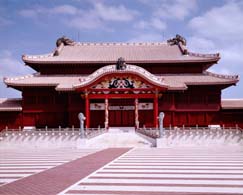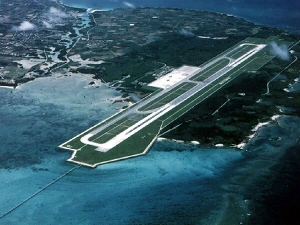
| HOME | CONTENTS | BACK | NEXT |
|---|
 |
|
It is obvious what the author, Professor Xu Yong of the Beijing University means to say:
Okinawa is not a Japanese territory!!
It is amazing that China is not satisfied by only demanding its sovereignty over Senkaku Islands (尖閣諸島)[7] — that China just started to claim only a few decades ago since 1971[*1] — and now it is too obvious that its evil design actually aims at the whole Okinawa Islands. In fact, there is an essential aspect that China decisively lacks of, — because it is China — the most important matter, the "will" of the Okinawa people. The essential aspect of democracy, the "public consensus" is totally missing in China's concept. I am doubtful whether the Chinese people know the definition of respecting public consensus though.
Since the establishment of the "People's Republic of China" (Communist China) on October 1, 1949, China has claimed its sovereignty over Taiwan which has never been ruled by the Communist China. China holds its principle of the "Armed Liberation" to "invade Taiwan" if Taiwan attempts to become independent by replacing the name "Republic of China" with "Republic of Taiwan." But actually, not just invading Taiwan, now we know that China is also watching for a chance to capture Okinawa.
China (People's Republic of China) is not a country of parliamentary democracy with a multi-party parliamentarian system. Since its establishment, the Chinese Communist Party is the sole party in power in China that controls the Chinese People's Liberation Army. In reality, the one-party dictatorship formulates the system, "Party=Army=Government." The system of democracy — the cabinet administrates the national politics that is selected from the parliament consisting of elected members — does not exist in China. The leadership of the Communist Party is eternal and there is no concept of the public consensus. Although China defines its principle "liberation" as a "return to homeland China," Taiwan will never be "liberated" by such a nation of one-party dictatorship since there is no concept of "public consensus." Do Taiwanese citizens really wish to "return to China?" If not, what issues does China need to consider? However, China only keeps menacing Taiwan by launching its "Armed Liberation" to restrain the independence movement. China's attitude only makes the Taiwanese people to be cautious.
"The sovereignty over Okinawa is unsettled" — the danger of Okinawa is the same matter as Taiwan. China attempts to build up a "quibble theory" as a bridgehead to claim Okinawa as its territory. The consensus of Okinawa people is lightly dismissed by China. We know the history of Okinawa that it used to be an independent kingdom Ryûkyû, the Satsuma domain (薩摩藩) [curt. Kagoshima 鹿兒島][8] made it a subject in 1609 (Shimazu rule), and the new Meiji Government abandoned the "Ryûkyû domain" to establish the "Okinawa Prefecture" in 1809. Because of the historical background, there is some antipathetic and distrusting sentiment to the Yamato [Japan proper, or the mainland Japanese] (大和) among the Uchinanchu [native Okinawan] (沖縄聚).[9] Okinawa has a painful history that was the only place a land battle took place in Japan[10] during the Great East Asian War [Pacific War] (大東亞戰爭). Okinawa became under control of the United States for 27 years and was returned to Japan on May 15, 1972 by the strong wish of the Okinawan peoples.
China's claim, "the sovereignty over Okinawa is unsettled" is no other than insulting the Okinawa peoples by trampling on their will. The China's slogan, "Return to the homeland China, the big family of the Chinese" does not sound attractive for the Taiwanese nor the Okinawan if China keeps menacing to launch its "armed liberation" in its Sinocentric concept.
Before concluding this essay, I am introducing a news article on March 18, 2005.
|
 |
The teachings of ancient China says, "an excellent ruler is a man of noble and virtue rather than being excellent in military powers." If China wishes not only Taiwan but also Okinawa to "return to the homeland China, the big family of the Chinese," China itself must be the "patriarch of virtue" that makes anybody wish to belong to, rather than threatening or claiming. But the true color of the Communist China is:
People's Republic of China was born from the gun muzzle.
Unfortunately, the reality is not the one we can expect to be the patriarch of virtue anyway...
As long as China neglects Japan's sovereignty over Okinawa and the public consensus of Okinawa, keeps the stance that "Okinawa is China's potential territory" and claiming "The sovereignty over Okinawa is unsettled," we can simply regard that the "sovereignties over Tibet, East Turkestan, South Mongolia and Manchuria are unsettled" — that nations all China invaded and annexed under the name of "Liberation" — to support independence movements of these suppressed nations. China has no right to complain, "it is interference in internal affairs of China" because China has already interfered Japan's internal affairs more than enough. The current condition of the relations between two countries is far from "friendly coexisting neighbors" and is rather "confronting competitors in life and death struggle." To maintain peace and stability in East Asia, it is indispensable to conduct the Fukoku Kyôhei [Enrich the country, strengthen the military] (富國強兵)[11] to restrain China gaining its hegemony. The diplomatic attitude what Japan needs is "to say clearly whatever we need to say" no matter they like or not.
NB:
Tibet
Annotations
*1. China started claiming its sovereignty over Senkaku Islands since 1971 after the United Nations' marine survey in 1969 and 1970 that reported there is a possibility of existing of estimated 109.5 billion barrels of oil under the seafloor around the islands.
Terms and Related information (Wikipedia Links)
- Okinawa Prefecture (沖縄縣)
http://en.wikipedia.org/wiki/Okinawa- Okinotori Island (沖ノ鳥島)
http://en.wikipedia.org/wiki/Okinotori- Ryûkyû Kingdom (琉球王國)
http://en.wikipedia.org/wiki/Ryukyu_Kingdom- Edo Period (琉球王國), 1603-1867.
http://en.wikipedia.org/wiki/edo_period- Ch'ing [Qing] Dynasty (淸), 1644-1912.
http://en.wikipedia.org/wiki/Qing- Potsdam Declaration, July 26, 1945.
http://en.wikipedia.org/wiki/Potsdam_Declaration- Senkaku Islands (尖閣諸島)
http://en.wikipedia.org/wiki/Senkaku_islands- Satsuma han (薩摩藩)
http://en.wikipedia.org/wiki/Satsuma_han- Uchinanchu [the native Ryûkyûans] (沖縄聚)
http://en.wikipedia.org/wiki/Ry%C5%ABky%C5%AB_peoples- Battle of Okinawa (沖縄戰), 1945.
http://en.wikipedia.org/wiki/Battle_of_Okinawa- Fukoku Kyôhei [Enrich the country, strengthen the military] (富國強兵)
http://en.wikipedia.org/wiki/Fukoku_kyohei
| HOME | CONTENTS | BACK | NEXT |
|---|